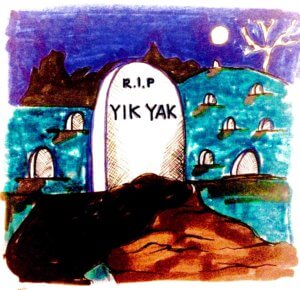Now bear with me for a second here. I know that I just dug up a year-old corpse most would like to stay well buried under the ground. However, I ask you to tolerate the stench for about five hundred words, so I can show you, via an autopsy of the decayed mass, that it was not all cancerous growths and casual racism.

The hardest part of this article is defending an app that was known for its offensive nature and enabling of racism, and I will fully admit, as you can see from my portrait thingy, I don’t experience a whole lot of discrimination myself. However, Yik Yak was no more than a tool, and like any tool it is as good or as bad as the people using it. The anonymous nature of Yik Yak allowed for unadulterated shitposting by people who think books are only good for starting fires. However, it allowed everyone else to isolate this bullfuckery and challenge it, criticize it, and try to use words and faith to make the shitposters entire argument moot, if not change their minds, without fear of repercussions. Also, anything could be downvoted and removed, which meant the most toxic of posts could be removed via direct democracy.
Yik Yak was at times as toxic as teenage drama (because half the time that was all it was), but, as mentioned above, everyone could use the app. Unlike other social media apps, where you are confined to the limited number of people you know from the gym or Magic: The Gathering tournaments, Yak connected everyone in a small radius regardless of their clique. As a person who loves debate, it is strange to me that the only platform where the entire student body could, in theory, engage with everyone else was an anonymous app. It permitted all sorts of people, who would never even look twice at each other, to talk and share their feelings. It was a respite for those who needed to vent their feelings, where others would provide support, as the app was anonymous.
People shared kind-hearted jokes that cheered up the entire Yak community. People could share praise and advice without expecting a shred of personal attention (outside of upvotes). Some examples included thanking the plow drivers for keeping the roads clear in a winter storm, telling everyone that there were free cookies in the library, or allowing two random people to meet up IRL in the north-side quad to make a snowman.
Why is this dead and forgotten app even slightly important? New anonymous apps are set to take the throne left empty by Yik Yak, and these titans of social media have become polarized war zones (especially since Twitter became the capital of Trump’s America). We should remember, now more than ever, everything Yik Yak did right if we are to put an end to the continuous flame wars and petty arguments that are status quo.





